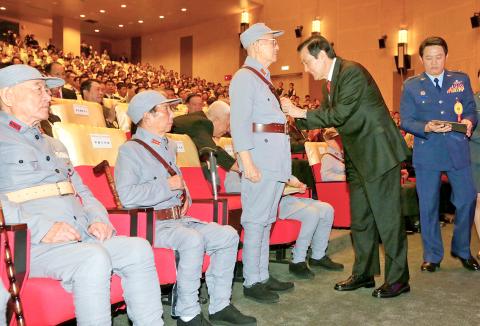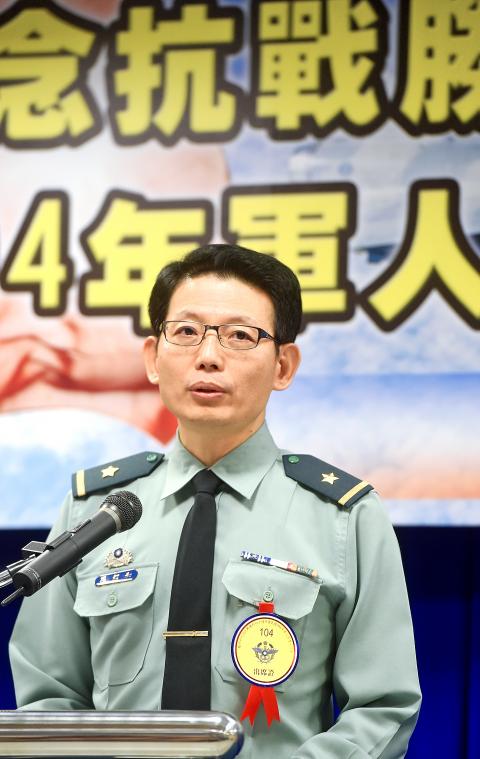President Ma Ying-jeou (馬英九) yesterday expressed regret over a claim by Beijing that Chinese Communist Party (CCP) forces played a significant role in the victory in the Second Sino-Japanese War, while a former high-ranking Chinese Nationalist Party (KMT) official put it more bluntly, accusing former vice president Lien Chan (連戰) of being “disgraceful and belittling himself” over his insistence on attending a military parade to commemorate the end of the war in China today.
During a meeting with Chinese President Xi Jinping (習近平) in Beijing on Tuesday, Lien said: “The [then-]Chinese Nationalist Party forces led by Chiang Kai-shek (蔣介石) fought a series of decisive and major battles on the front lines and dealt the Japanese military a heavy blow, and the Chinese Communist Party forces led by Mao Zedong (毛澤東) effectively pinned down and crushed the Japanese and the collaborationist armies on the battlefield behind enemy lines.”
Xi, who is also the general secretary of the CCP, said that the KMT and the CCP “cooperated and coordinated” actions during the campaign against Japan and that “both made significant contributions to the victory.”

Photo: CNA
Speaking in Taipei at a ceremony to commemorate the 70th anniversary of the end the Second Sino-Japanese War, Ma said that it was Chiang who led the Republic of China (ROC) to victory in the eight-year war against Japan.
“We feel regret” that the CCP has been claiming that it led China in the war against Japan and has been ignoring the fact that the Chinese Nationalist Party government directed the war and the ROC military made the greatest contribution, Ma said.
“We have never denied that Communist forces participated in the war against Japan, but the Communist forces did not maintain leadership and instead played a supplementary role, which is the historical truth,” Ma said.

Photo: Chien Jung-fong, Taipei Times
The Ministry of National Defense also took issue with Lien’s remarks, saying that the ministry “cannot accept or agree with” the comments made by Lien in China.
His comments have “deviated from historical facts,” it said.
“Whether on the front lines or behind enemy lines, the ROC government led the campaign,” ministry spokesman Major General David Lo (羅紹和) said.
With regard to today’s parade in Beijing, ROC retired generals should firmly support the government and not travel to China to attend such activities, Lo said.
He urged them to “safeguard national and historical dignity and avoid causing misunderstandings among the public and trouble for the government.”
Beijing has invited Lien and ROC retired generals to attend a series of events for the anniversary.
Lien’s visit has not been endorsed by the government.
Former National Development Council minister Kuan Chung-ming (管中閔) reacted to Lien’s visit with fury.
Kuan questioned the veracity of Lien’s comments with regard to the Second Sino-Japanese War, posting scathing remarks on Facebook..
“A direct assault was only good enough to ‘deal a heavy blow,’ but attacking from behind the enemies’ back was enough to crush them?” Kuan wrote.
He added that Lien should have referred to Chiang as “Chairman Chiang,” even if it meant he would have to refer to Mao as “Chairman Mao.”
“However, Lien, as a former KMT chairman, disrespectfully omitted Chiang’s official title,” Kuan said.
“All in all, [Lien is] base, disgraceful and self-belittling,” Kuan said, adding: “And you [Lien] want to spectate at [China’s] military parade? Spectate my ass!”

Taiwan is projected to lose a working-age population of about 6.67 million people in two waves of retirement in the coming years, as the nation confronts accelerating demographic decline and a shortage of younger workers to take their place, the Ministry of the Interior said. Taiwan experienced its largest baby boom between 1958 and 1966, when the population grew by 3.78 million, followed by a second surge of 2.89 million between 1976 and 1982, ministry data showed. In 2023, the first of those baby boom generations — those born in the late 1950s and early 1960s — began to enter retirement, triggering

ECONOMIC BOOST: Should the more than 23 million people eligible for the NT$10,000 handouts spend them the same way as in 2023, GDP could rise 0.5 percent, an official said Universal cash handouts of NT$10,000 (US$330) are to be disbursed late next month at the earliest — including to permanent residents and foreign residents married to Taiwanese — pending legislative approval, the Ministry of Finance said yesterday. The Executive Yuan yesterday approved the Special Act for Strengthening Economic, Social and National Security Resilience in Response to International Circumstances (因應國際情勢強化經濟社會及民生國安韌性特別條例). The NT$550 billion special budget includes NT$236 billion for the cash handouts, plus an additional NT$20 billion set aside as reserve funds, expected to be used to support industries. Handouts might begin one month after the bill is promulgated and would be completed within

The National Development Council (NDC) yesterday unveiled details of new regulations that ease restrictions on foreigners working or living in Taiwan, as part of a bid to attract skilled workers from abroad. The regulations, which could go into effect in the first quarter of next year, stem from amendments to the Act for the Recruitment and Employment of Foreign Professionals (外國專業人才延攬及僱用法) passed by lawmakers on Aug. 29. Students categorized as “overseas compatriots” would be allowed to stay and work in Taiwan in the two years after their graduation without obtaining additional permits, doing away with the evaluation process that is currently required,

IMPORTANT BACKER: China seeks to expel US influence from the Indo-Pacific region and supplant Washington as the global leader, MAC Minister Chiu Chui-cheng said China is preparing for war to seize Taiwan, Mainland Affairs Council (MAC) Minister Chiu Chui-cheng (邱垂正) said in Washington on Friday, warning that Taiwan’s fall would trigger a regional “domino effect” endangering US security. In a speech titled “Maintaining the Peaceful and Stable Status Quo Across the Taiwan Strait is in Line with the Shared Interests of Taiwan and the United States,” Chiu said Taiwan’s strategic importance is “closely tied” to US interests. Geopolitically, Taiwan sits in a “core position” in the first island chain — an arc stretching from Japan, through Taiwan and the Philippines, to Borneo, which is shared by